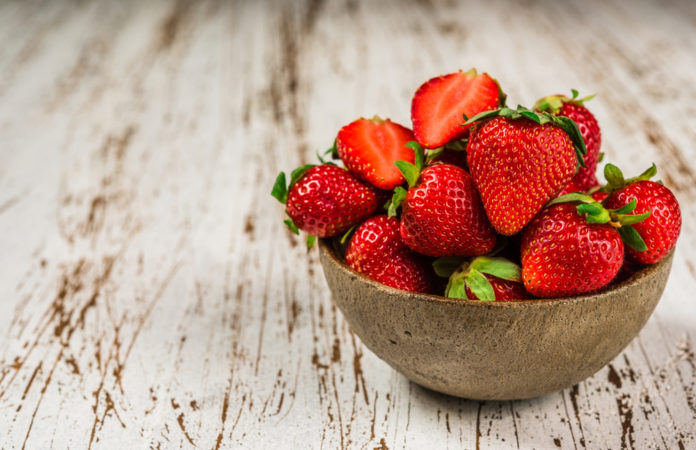The Crohn’s and Colitis Foundation estimates inflammatory bowel disease (IBD) affects as many as 1.6 million Americans, in which they are often diagnosed before age 30. And not to be confused with irritable bowel syndrome (IBS), which is generally less serious than IBD.
Inflammatory bowel disease can be extremely painful to individuals and result to major malabsorption issues related to chronic inflammation. But according to a new study, simply adding strawberries into an inflammatory bowel disease diet may reduce irritation in the gut.
What Is Inflammatory Bowel Disease?
Casually known as IBD, inflammatory bowel disease is an umbrella term used to describe a group of inflammatory conditions of the intestines, including Crohn’s disease and ulcerative colitis.
Crohn’s disease can occur anywhere between the mouth and the anus, while ulcerative colitis is limited to the colon. In Crohn’s disease, healthy parts of the intestine are often mixed in between inflamed areas and layers of the bowel wall. Ulcerative colitis is continuous inflammation of inner most lining of the colon.
The exact cause of IBD is not entirely understood, though there is speculation it may be a combo of heredity and a malfunction of the immune system. Symptoms of IBD can ebb and flow, range from mild to severe, and depend on the severity of inflammation and location of the inflammation. Signs and symptoms common to both Crohn’s disease and ulcerative colitis include:
- Severe diarrhea
- Blood in the stool
- Painful bloat
- Fatigue
- Reduced appetite
- Weight loss
Without proper management, IBD can lead to life-threatening complications. Though there is no known cure, there are methods to help reduce inflammation and improve quality of life, including diet modifications, medications, surgeries, and this berry good contender for inflammation reduction.
Strawberries for Inflammation and Health
Berries have been attributed to lower inflammation and improve health thanks to their high-fiber content and powerful antioxidant they contain, or compounds that may prevent or delay cell damage. Antioxidants have been explored to manage a number of health conditions, including cancer, heart disease, Alzheimer’s disease, and age-related macular degeneration.
According to the Arthritis Foundation, strawberries have also been touted as one of the best fruits for arthritis further explaining, “Research has also shown that women who ate 16 or more strawberries a week had lower C-reactive protein (CRP), a measure of body-wide inflammation linked to arthritis flares and heart disease.” Furthermore, research published in the Nutrition Journal found freeze-dried strawberry powder benefits women with metabolic syndrome by lowering total and LDL (or “bad”) cholesterol levels.
The laundry list only continues, as new evidence shows three-quarters of a cup of strawberries a day could be beneficial for those looking to enhance their gut health.
A Berry Good Case for Inflammation Reduction in IBD
Presented at a meeting of the American Chemical Society, researchers from University of Massachusetts found that strawberries can help improve the symptoms of inflammatory bowel disease.
“The sedentary lifestyle and dietary habits of many people in this country — high-sugar, high-animal-fat, but low-fiber diets — may promote colonic inflammation and increase the risk of IBD,” says Hang Xiao, Ph.D., who led the study. What’s more, there is a prominent link IBD and colorectal cancer risk, though the dietary consumption of fruits and vegetables has been associated with a lowered risk of IBD.
Related to their wide consumption in the general population, Xiao and his research team examined the impact of strawberries and whether or not they could decrease colonic inflammation. Furthermore, the researchers specifically chose to use whole strawberry powder, rather than purified compounds or extracts, to mimic normal consumption.
In the experiment, mice were fed doses of strawberries that matched with what a human could and would reasonably consume. They were then divided into four groups:
Group #1: Healthy mice consuming a regular diet
Group #2: Mice with IBD consuming a regular diet
Group #3: Mice with IBD consuming 2.5 percent whole strawberry powder
Group #4: Mice with IBD consuming 5 percent whole strawberry powder
Researchers found that dietary consumption of whole strawberries, at a dose equivalent to as low as ¾ cup of strawberries per day in humans, significantly curbed symptoms such as weight loss and bloody diarrhea in mice with IBD. Furthermore, the use of the strawberry powder benefits the mice’s colonic tissue, a culture that checks for the cause of disease, in which inflammation reduction was observed.
Lowered inflammation also caused a significant decrease in the number of harmful bacteria present in their guts. (With IBD, the abundance of harmful bacteria increases while levels of beneficial bacteria decrease in the colon.)
Beneficial bacteria helps which helps create and nurture a healthier microbiome, or the composition of bacteria, archaea, viruses, and microbes that reside both in and on the body. These observations led researchers to believe strawberries are able to affect abnormal metabolic pathways in IBD responsible for colonic inflammation and the associated “bad” bacteria in the gut.
The Bottom Line:
While the study focuses on the impact of inflammation reduction of strawberries in IBD, the research commends strawberries can prospectively benefit those looking enhance gut health (specifically in the absence of a strawberry allergy).
And remember, the research suggests even just a ¾ cup of strawberries can be beneficial! Although strawberries are luscious as is, they can be prepared and enjoyed in a variety of ways, including starting the morning off with a sweet pea strawberry banana smoothie, snacking on a simple and sweet strawberry salsa, indulging on this guilt-free strawberry gelato, and repurposing overripe strawberries in jam.
It is also imperative to mention you should promptly consult with a doctor if experiencing such gastrointestinal symptoms for careful analysis. If diagnosed with IBD, continue care under the guidance of a healthcare professional or team to lower the risk of harmful consequences and optimize quality of life. Also always consult with a doctor before changing a treatment plan, including components of an inflammatory bowel disease diet.








